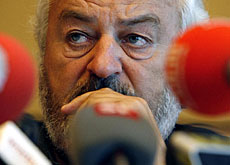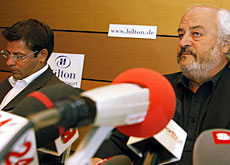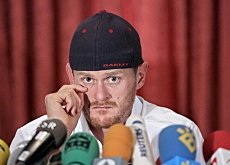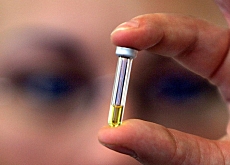Phonak boss not bitter with Landis

The head of Phonak Cycling, Andy Rihs, tells swissinfo he has no axe to grind with the doping cheats who brought about the collapse of his team.
Rihs announced on Tuesday the team would disband at the end of the year after sponsors bailed out following revelations that Tour de France winner Floyd Landis had failed a drug tests.
Landis was the latest in a string of Phonak riders to be sacked, but Rihs still insists that the team’s doping controls are the best in the world.
He also believes Swiss cycling will overcome the scandal despite having no major, locally based, team from next year.
swissinfo: You have expressed your sadness at the demise of the team, but are you angry at the people who caused this?
Andy Rihs: Each case is individual. At the time [Landis tested positive] I was really angry because we got so close only to have it taken away. But you have to look forwards and I will never look back in anger. I feel bad for him [Landis] too.
I know these guys and I wouldn’t say that they are really bad. Just like for the rest of us, sports involves different types of people.
swissinfo: Does this spell the end of professional cycling in Switzerland?
A.R.: Of course Swiss cycling would be much better off with a team because it helps with training and bringing the riders onto the professional circuit. But it’s not the first time that Switzerland has not had a professional team and it is not absolutely necessary.
I will continue to help the Swiss cycling federation develop young riders. I sponsor children’s and women’s cycling and I will personally take as many bicycle rides as I can.
swissinfo: Why did Phonak have so many cases of doping in recent years?
A.R.: I have tried to find the answers to this because Phonak Cycling has more measures against this than anyone else and it is a fact of life that the Swiss have the best doping controls in the world. But it is a paradox that I can find no answer to.
Maybe one day somebody will tell me how this happened, but at the moment I just don’t know.
swissinfo: Can cycling ever escape the stain of doping?
A.R.: There are doping controls in all sports, such as football, tennis and swimming, but cycling is the most controlled sport of all. There are 12,000 to 13,000 tests among 800 professional cyclists every year and that is far more than any other sport.
Cycling has become the black sheep and the perception is that all doping happens in cycling – but that is certainly not true.
swissinfo: Throughout your whole time in cycling, was it a good or bad experience?
A.R.: This team was created for business reasons: to promote the name of Phonak and to spread the idea that good hearing means good living. We used the team to promote hearing aids, and from that perspective we were extremely successful.
The business side was logical, but the sporting side was ruled by heart and passion. The doping scandal was a real tragedy for us because we were well on the way to becoming the top team in the world. I regret this from a sporting viewpoint and for the many young riders in the team.
swissinfo-interview, Matthew Allen in Zurich
The Phonak Cycling team was created in 2002 and finished second in the 2005 ProTour circuit team rankings.
Earlier this year, Barclays Bank subsidiary iShares had agreed to take over as the team’s main sponsor, but the contract was severed after Landis failed the drugs tests.
On July 27 it was announced that a test on Phonak’s Floyd Landis after Stage 17 of the Tour de France on July 20 showed an “unusually high” level of testosterone in his urine.
A second test confirmed the presence of exogenous testosterone in Landis’ body, making him the first winner of the Tour to be tested positive for doping.
In March 2006 Swiss Phonak rider Sascha Urweider was suspended following a positive test for high levels of the male hormone.
In 2004 three Phonak riders were all found guilty of doping violations and fired: Tyler Hamilton and Santiago Perez (blood doping) and Oscar Camenzind (EPO).
The sport’s ruling body, International Cycling Union, refused to give Phonak a licence to compete in 2005, but this decision was later overruled by the Lausanne-based Court of Arbitration for Sport.

In compliance with the JTI standards
More: SWI swissinfo.ch certified by the Journalism Trust Initiative




You can find an overview of ongoing debates with our journalists here . Please join us!
If you want to start a conversation about a topic raised in this article or want to report factual errors, email us at english@swissinfo.ch.